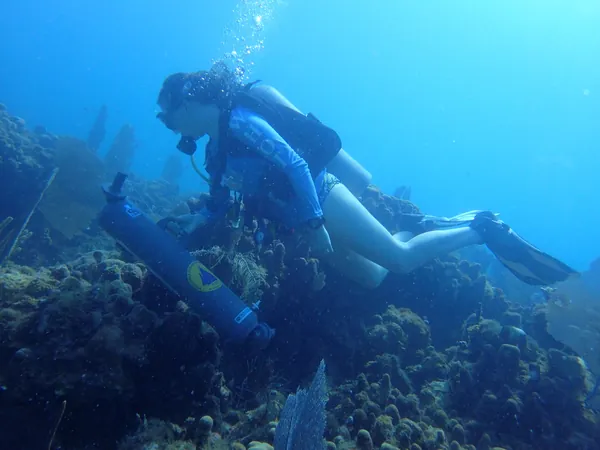
Revolutionizing Coral Reef Management: The Hidden Power of Microbes
2025-05-16
Author: Arjun
Unveiling the Microscopic Allies of Coral Reefs
Coral reefs are not just vibrant underwater ecosystems; they are home to a multitude of microscopic organisms that play a crucial role in their health. The stunning colors of corals largely come from algae that thrive within their tissues, providing essential nourishment. But lurking in the surrounding waters is a diverse microbial community—a veritable "soup" of bacteria, archaea, and other microbes that mirror the coral reefs' ecological status.
A Groundbreaking Study on Microbial Monitoring
In an enlightening new paper published in *Cell Reports Sustainability*, researchers Amy Apprill from the Woods Hole Oceanographic Institution and Jennifer Salerno from George Mason University unveil the immense potential of these microbial communities in monitoring and conserving coral ecosystems. They argue that analyzing reef waters can serve as a game-changing tool for managers, conservationists, and policymakers alike.
Why Microbes Matter: The Key to Coral Health
According to Apprill, understanding the microbial landscape is vital for assessing the overall health of coral reefs. Their research reveals that testing water for specific microbes not only aids scientists but also equips conservation teams with crucial data to protect these delicate ecosystems. "We aim to make our findings accessible to those who manage and protect these environments," Apprill states.
A Clearer Picture of Reef Health
Unlike traditional visual assessments, which offer limited insight, microbial sampling provides a comprehensive view of reef health. The paper includes practical strategies, estimated costs, and recommendations for conservationists eager to adopt these advanced techniques.
Microbial Indicators: What They Reveal
Bacteria and archaea are the most abundant microbes in coral habitats, responding dynamically to environmental changes such as nutrient levels and temperature. Their presence can signal potential threats: for instance, E. coli often points to pollution, while certain photosynthetic microorganisms can indicate a thriving ecosystem. Salerno comments on the growing utility of microbes as environmental indicators, suggesting that better diagnostic tools could transform coral reef management.
Accessible Solutions: Non-invasive Sampling Techniques
The study emphasizes that microbial monitoring can be conducted using diverse, cost-effective methods, making it accessible to various stakeholders. From simple microscopy to advanced DNA analysis, the range of options means anyone, from citizen scientists to professional researchers, can contribute to coral conservation.
Call to Action: Standardization and Collaboration
The authors advocate for standardized microbial monitoring methods and increased collaboration between scientists and organizations. By strategically choosing where and when to sample, they aim to ensure meaningful, large-scale evaluations of reef health.
The Urgent Need for Action in Coral Conservation
As coral reefs face unprecedented threats from climate change, including record-breaking bleaching events, the urgency for effective monitoring tools has never been greater. Apprill emphasizes, "We must equip decision-makers with comprehensive information to bolster our reef ecosystems, which are crucial for marine biodiversity." Manipulating our understanding of microbes could usher in a new era of empowered coral reef management.
The Future: A Microbial Health Index for Coral Reefs
Aspiring to advance our understanding of reef-microbe interactions, the researchers propose creating an open-access database to facilitate the use of machine learning in analyzing microbial data. By utilizing global patterns, they envision the development of a microbial health index, further aiding the conservation efforts.
Conclusion: The Exciting Frontier of Reef Management
Ultimately, Apprill and Salerno hope to ignite enthusiasm for incorporating microbial studies in existing coral reef monitoring programs. By enhancing our knowledge, we can elevate our conservation strategies and work toward a more resilient future for these essential marine habitats.

 Brasil (PT)
Brasil (PT)
 Canada (EN)
Canada (EN)
 Chile (ES)
Chile (ES)
 Česko (CS)
Česko (CS)
 대한민국 (KO)
대한민국 (KO)
 España (ES)
España (ES)
 France (FR)
France (FR)
 Hong Kong (EN)
Hong Kong (EN)
 Italia (IT)
Italia (IT)
 日本 (JA)
日本 (JA)
 Magyarország (HU)
Magyarország (HU)
 Norge (NO)
Norge (NO)
 Polska (PL)
Polska (PL)
 Schweiz (DE)
Schweiz (DE)
 Singapore (EN)
Singapore (EN)
 Sverige (SV)
Sverige (SV)
 Suomi (FI)
Suomi (FI)
 Türkiye (TR)
Türkiye (TR)
 الإمارات العربية المتحدة (AR)
الإمارات العربية المتحدة (AR)